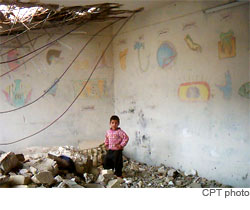 I write these words from Iraq, where I have worked through the Christian Peacemaker Teams (CPT) since October 2002 - before, during, and since the 2003 U.S. invasion of Iraq. CPT attempts to follow Jesus as we seek to reduce violence in conflict areas around the world. In Iraq our team has worked at this by accompanying Iraqi people in dangerous situations, "truth telling" through our reports on the abuse of detainees and other consequences of war and occupation, and training and working along side local organizations on projects of reconciliation and finding nonviolent alternatives to the problems they face. This fall and winter, we have been working in the Kurdish north - accompanying people who are sanctioned for speaking out against human rights abuses, and families displaced by violence by Turkish troops on the borders.
I write these words from Iraq, where I have worked through the Christian Peacemaker Teams (CPT) since October 2002 - before, during, and since the 2003 U.S. invasion of Iraq. CPT attempts to follow Jesus as we seek to reduce violence in conflict areas around the world. In Iraq our team has worked at this by accompanying Iraqi people in dangerous situations, "truth telling" through our reports on the abuse of detainees and other consequences of war and occupation, and training and working along side local organizations on projects of reconciliation and finding nonviolent alternatives to the problems they face. This fall and winter, we have been working in the Kurdish north - accompanying people who are sanctioned for speaking out against human rights abuses, and families displaced by violence by Turkish troops on the borders.
After five years of being in the midst of the instability and suffering of the Iraqi people - hearing their pain, fear, and increasing hopelessness as they tell us about their lives, their shattered hopes and dreams - witnessing and experiencing violence ourselves as a team; but also witnessing truely courageous people who have not lost faith and hope as they work for peace, I am led to reflect on the legacy of the war and occcupation as I write the following:
After five years of war, Iraqis live with:
- Deaths of an estimated 794,000 Iraqi civilians. (John Hopkins University study)
- A physically devastated society. The rebuilding of Iraq's society and infrastructure has progressed very little. There is still a lack of clean water, electricity, and fuel. Medicine or medical equipment in hospitals and health centers are grossly inadequate.
- Continued economic crisis. There is still massive unemployment, poverty, and increased malnutrition. The Iraqi government is under pressure by U.S. government to pass a new oil law which could allow foreign corporations equal access to new oil fields, resulting in billions of dollars in oil revenues being taken out of the country.
- Anger and despair increasing as Iraqis lose hope for a better life.
- Iraqi and U.S. forces continuing violent house raids and brutal detentions of Iraqi men. Many innocent detainees are forced, through torture, to confess to acts of terror they did not commit.
- Civilians living in fear due to daily explosions, gun battles, and personal attacks. Sectarian violence, exacerbated over the years by U.S. Military presence and policies as well as by Iraqi police and military forces.
- Women subjected to increased violence and loss of personal rights and freedoms.
- Children growing up seeing violence and killing as the norm.
- A country-side polluted with radioactive depleted uranium from U.S. weaponry used in the 1991 and 2003 wars with Iraq, resulting in increased cancers and birth defects.
- An elected government and ratified constitution, but with a government that most Iraqis feel doesn't really represents them and their needs. Sunni Iraqis fear the influence of Iranian government on the mostly-Shia, Iraqi central government.
- The U.S. military in the process of transferring "security" to Iraqi police and military - but instead of feeling protected, Iraqis feeling terrorized by these forces which have been trained and equipped by U.S. forces that have also trained human rights abusers in Latin America.
- Iraqis also being told that the only way to security is through excessive violence and giving up their civil rights.
- Continuation of collective punishment. One U.S. antiterrorism strategy in Iraq is to surround and attack, often with heavy bombing, whole neighborhoods, villages and cities. After attacks, non-combative civilians killed are often labeled "terrorists," in news reports. (During the November, 2004 attacks of Fallujah, 65% of the buildings, of a city of 300,000 residents, were destroyed.)
- Because of the hardship and dangers, an estimated 4 million Iraqis fleeing their homes to other countries or as displaced persons in their own country.
- Instead of U.S. military presence bringing stability, perpetuating instability.
Words cannot express the anguish that the Iraqi people have experienced in these last five years because of the war. The longer occupying forces are in their country, the longer they suffer the violence and hardship of daily life. We must not continue to justify paying for and prolonging this war.
 Peggy Gish is a fulltime worker with Christian Peacemaker Teams, which seeks to enlist the whole church in organized, nonviolent alternatives to war and places teams of trained peacemakers in regions of lethal conflict. CPT initiated a long-term presence in Iraq in October 2002. She is the author of Iraq: A Journey of Hope and Peace.
Peggy Gish is a fulltime worker with Christian Peacemaker Teams, which seeks to enlist the whole church in organized, nonviolent alternatives to war and places teams of trained peacemakers in regions of lethal conflict. CPT initiated a long-term presence in Iraq in October 2002. She is the author of Iraq: A Journey of Hope and Peace.
Got something to say about what you're reading? We value your feedback!
